
8 Must-Know Types of Seating Arrangements for Meetings
Meetingselect

The way you arrange seats in a meeting can highly impact the flow of your conversations. So, to make sure you reach your meetings goals, making a seating plan should be on top of your list. We’ll take you through 8 must-know seating arrangements for meetings.
How do you choose the best seating arrangements for meetings?
Whether you’re hosting a brainstorming session, a business, a conference, or a presentation, each corporate meeting requires a fitting seating arrangement. If you want to stimulate insightful discussions, your event seating has to be laid out to encourage conversation. When you invite a speaker, the seating should be directly pointed at them.
First, find your ideal meeting venue. Then, start to make an effective seating plan. You’ll need to consider a few different things:
- What are your goals for the event?
- How many guests do you expect?
- What activities are on the agenda?
And now, compare them to the different seating arrangements and find one that suits your event the most! Let’s jump into it, shall we?
1-Auditorium
If you’ve ever attended a lecture or been to the movies, you’re probably familiar with this one. The auditorium style seating arrangement involves a lot of built-in seats or rows of chairs parallel to a single point of focus. This could be a professional stage or a presentation area. This is one of the seating arrangements for meetings that seats a large number of guests comfortably.
Pros:
- Great for presentations, lectures or award shows
- Ideal for a large number of guests
- Doesn’t encourage audience participation or conversation
- Sound is often an issue
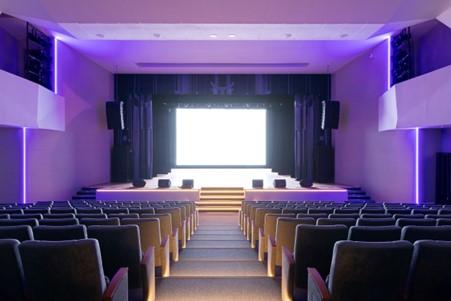
2-Banquet
Are you planning to have a business dinner? Then the banquet event seating is the way to go. This seating plan uses round tables spread out throughout the space, with each accommodating around 8-10 guests. This classic, popular style of seating makes socializing easy and comfortable. Group guests who are familiar with each other together, or seat your guests according to shared interests.
Pros:
- Ideal to encourage conversations and group participation
- Flexible and spread-out setting
Cons:
- Makes it difficult to interact with guests sitting at other tables
- Only comfortable in a large space
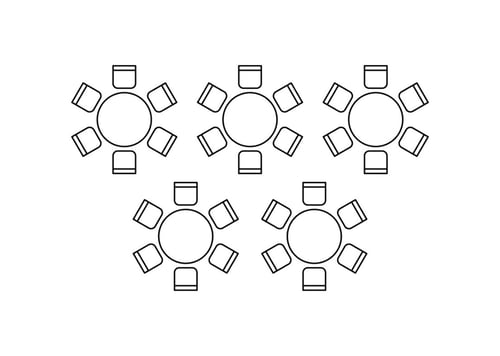
3-Boardroom
Our list of seating arrangements for meetings isn’t complete without the classic boardroom style. This layout features a long, rectangular table for guests to sit facing each other. Not only great for group discussions, but also for conference calls or brief visual presentations.
Pros:
- Enables strategic placement for meetings
- Encourages discussions
- Directs focus to one person
Cons:
- Not ideal for long visual presentations
- Makes it difficult for all guests to be heard
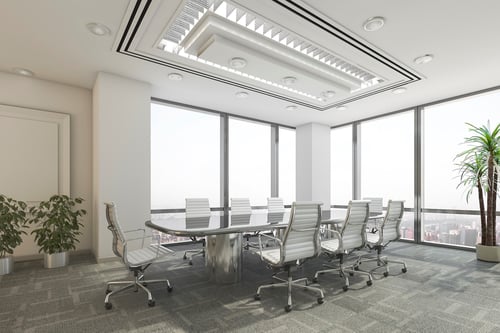
4-Cabaret
This event seating arrangement is similar to the banquet-style layout, using round tables with chairs placed around them. However, the tables are smaller, so they have fewer chairs around them. The chairs also leave a gap that points towards a specific focal point. This is ideal for when you want your guests to socialise, but also be able to remain focused on the performance or presentation.
Pros:
- Conversations are encouraged while the focal point is still visible
- Feels relaxed and natural
Cons:
- Only comfortable in a large space
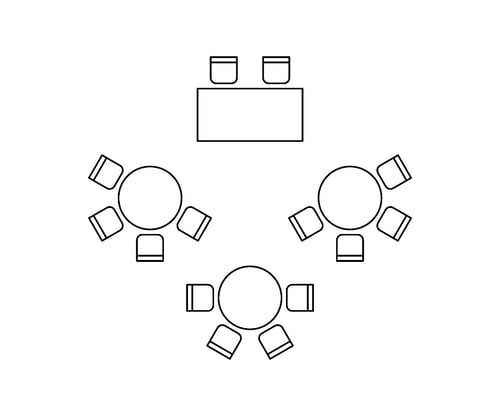
5-Chevron
What’s a great event seating arrangement for a walk down the aisle, as well as a presentation? The chevron style seating. This one features several short, angled rows with an aisle way down the middle. Typically, planners use this style to direct attention towards the point of focus and strategically seat guests next to each other.
Pros:
- Everyone can view the centre and work in small groups
- Encourages conversation
- Makes maximum use of the space
Cons:
- Seats need to be staggered to ensure guests can see the centre
- Not ideal for large group discussions
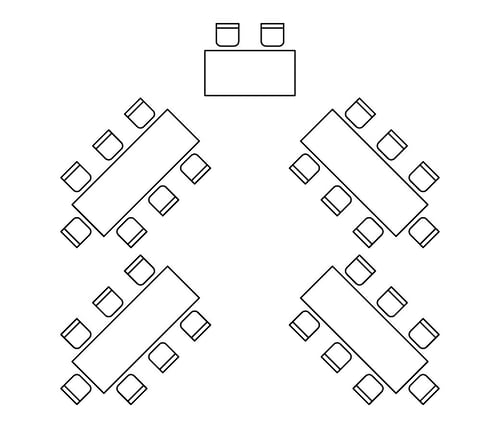
6-Classroom
Some seating arrangements for meetings might remind you of your years at school. The classroom style takes you right back. It features long tables of 4 guests in rows, sometimes split into columns. This encourages brainstorming with a buddy, but also leaves enough space to focus on your own notes. If you’re organising an event where guests want to learn something new, this is the ideal event seating plan.
Pros:
- Encourages brainstorming and note-taking
- Focuses attention to the front of the room
Cons:
- Feels overcrowded when there's not enough space in between guests
- May feel cliché or nostalgic

7-Hollow square
A hollow square seating plan uses rectangular tables arranged to create a square. Because of the empty space in the middle, all guests can see each other while maintaining a comfortable distance. Use this event seating for eating meals, working on laptops or smaller collaborative meetings.
Pros:
- Encourages comfortable discussions
- Collaboration is easy as all guests are visible to one another
- Supports eating and working
Cons:
- There’s no clear point of focus
- Not great for presentations
- Doesn’t make maximum use of the space

8-U-shaped
Also known as horseshoe seating, this event seating plan places tables in a U-shape facing a stage or podium. This way, all guests can communicate with each other, while they also remain focused on the centre of the space. This is one of the best seating arrangements for meetings that require group collaborations and presentations.
Pros:
- Encourages learning and socialising
- Enables guests to interact with the speaker
- Everyone can see each other
Cons:
- Not ideal for a large number of guests
- Requires a designated leader to manage the dialogue
- Doesn’t maximise the space
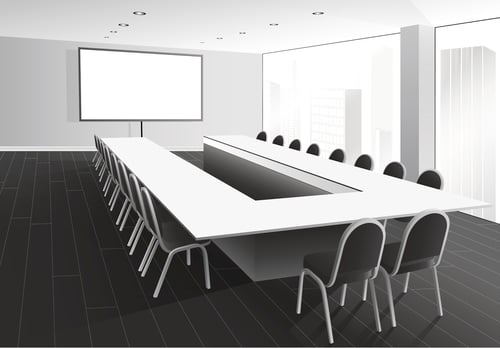
Find the ideal meeting venue for your seating plan
Seating arrangements for meetings are important, but finding a venue that supports your plan is, too. Meetingselect is the all-in-one marketplace for all your meeting management needs. With our platform, you:
- Easily book, manage and track your meetings online
- Get access to over 500,000 hotels and meeting spaces
- Reduce your carbon footprint with every venue you book


